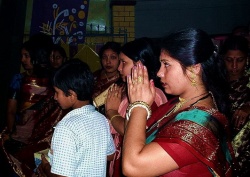Difference between revisions of "Kanhā"
(Created page with "thumb|250px| '''Kanhā''' 1. Kanhā. Daughter of the king of Kosala. Before she was born, Brahmadatta, king of Benares, killed her father and c...") |
|||
| (2 intermediate revisions by the same user not shown) | |||
| Line 1: | Line 1: | ||
[[File:Bangladesh Prayer.jpg|thumb|250px|]] | [[File:Bangladesh Prayer.jpg|thumb|250px|]] | ||
| − | |||
| − | |||
| − | By her strong passions she won the love of them all. Not satisfied with them, she also made love to a hump-backed slave who was in her service. One day, when she was sick, all her husbands were gathered round her, and she made signs to each of them to show that she loved him best. Ajjuna, however, was suspicious, and by questioning the hump-back, learnt the truth. The five brothers left her and retired to the Himalaya, where they became ascetics. The story was related by Kunāla, who is identified with Ajjuna. | + | |
| + | '''[[Kanhā]]''' | ||
| + | 1. [[Kanhā]]. Daughter of the [[king]] of [[Kosala]]. Before she was born, [[Brahmadatta]], [[king]] of [[Benares]], killed her father and carried off her mother. | ||
| + | |||
| + | When the child was born, [[Brahmadatta]] adopted her as his [[own]] daughter; she is, therefore, called [[dvepitikā]] (=having two fathers). | ||
| + | |||
| + | The [[king]] promised to grant her a boon, and she held a [[svayamvara]], at which she chose as her husbands all the five sons of [[King]] [[Pandu]]; [[Ajjuna]], [[Bhīma]], [[Nakula]], [[Yuddhitthila]], and {{Wiki|Sahadeva}}. | ||
| + | |||
| + | According to the [[Mahābhārata]], [[Draupadī]], daughter of the [[Pañcāla]] [[king]], was the wife of these five princes. | ||
| + | |||
| + | By her strong [[passions]] she won the [[love]] of them all. Not satisfied with them, she also made [[love]] to a hump-backed slave who was in her service. | ||
| + | |||
| + | One day, when she was sick, all her husbands were [[gathered]] round her, and she made [[signs]] to each of them to show that she loved him best. | ||
| + | |||
| + | [[Ajjuna]], however, was suspicious, and by questioning the hump-back, learnt the [[truth]]. The five brothers left her and retired to the [[Himalaya]], where they became [[ascetics]]. The story was related by [[Kunāla]], who is identified with [[Ajjuna]]. | ||
J.v.424, 426f. | J.v.424, 426f. | ||
| − | 2. Kanhā. See Kanhājinā. | + | 2. [[Kanhā]]. See [[Kanhājinā]]. |
{{R}} | {{R}} | ||
[http://what-buddha-said.net/library/DPPN/ka/kanhaa.htm what-buddha-said.net] | [http://what-buddha-said.net/library/DPPN/ka/kanhaa.htm what-buddha-said.net] | ||
[[Category:Buddhist Terms]] | [[Category:Buddhist Terms]] | ||
Latest revision as of 17:30, 7 January 2016
Kanhā
1. Kanhā. Daughter of the king of Kosala. Before she was born, Brahmadatta, king of Benares, killed her father and carried off her mother.
When the child was born, Brahmadatta adopted her as his own daughter; she is, therefore, called dvepitikā (=having two fathers).
The king promised to grant her a boon, and she held a svayamvara, at which she chose as her husbands all the five sons of King Pandu; Ajjuna, Bhīma, Nakula, Yuddhitthila, and Sahadeva.
According to the Mahābhārata, Draupadī, daughter of the Pañcāla king, was the wife of these five princes.
By her strong passions she won the love of them all. Not satisfied with them, she also made love to a hump-backed slave who was in her service.
One day, when she was sick, all her husbands were gathered round her, and she made signs to each of them to show that she loved him best.
Ajjuna, however, was suspicious, and by questioning the hump-back, learnt the truth. The five brothers left her and retired to the Himalaya, where they became ascetics. The story was related by Kunāla, who is identified with Ajjuna.
J.v.424, 426f.
